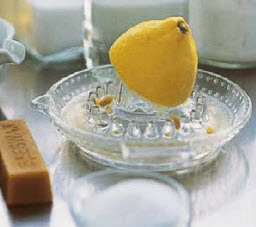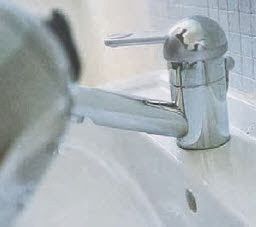Clean, green, and frugal: homemade cleaning recipes
Store-bought cleaning products are effective, but contain harsh chemicals and can produce irritating fumes. Simple ingredients from the pantry can be used to make cleaners that are kinder to the environment—for a fraction of the cost.
Diluted white vinegar:
Mildly acidic white vinegar dissolves dirt, soap scum, and hard water deposits from smooth surfaces, yet it is gentle enough to use in solution to clean hardwood flooring. White vinegar is a natural deodorizer, absorbing odors instead of covering them up. (And no, your bathroom won’t smell like a salad. Any acid aroma disappears when dry.) With no coloring agents, white vinegar won’t stain grout on tiled surfaces. Because it cuts detergent residue, white vinegar also makes a great fabric softener substitute for families with sensitive skin. In the kitchen, use vinegar-and-water spray to clean countertops, lightly soiled range surfaces and backsplash areas.
In the bathroom, spray countertops, floors, and exterior surfaces of the toilet. For really tough bathroom surfaces such as shower walls, pump up the cleaning power by heating the solution in the microwave until barely hot. Spray shower walls generously with the warmed solution, allow to stand for 10–15 minutes, then scrub and rinse.
* A mild acid, lemon juice can be used instead of vinegar for general cleaning. Use the outer rind to polish porcelain surfaces and release fragrant lemon oil. If you have a garbage disposal unit, grind the rind in it while running cool water down the drain. The oils in the rind clean the disposal unit and sharpen the blades.
* Keep bathroom drains running freely and smelling sweet by pouring 1⁄2–3⁄4 cup (20–40g) baking soda into the drain, and dribbling just enough hot water to wash the solution down. Let stand for 2 hours to overnight, and then flush thoroughly with hot water. (Do not use on blocked drains.)
Undiluted white vinegar:
Used straight from the jug, undiluted white vinegar makes quick work of tougher cleaning problems involving hard water deposits or soap scum. Use it to clean the inside of the toilet bowl. Before you begin, dump a bucket of water into the toilet to force water out of the bowl and allow access to the sides.
Pour undiluted white vinegar around the bowl and scrub with a toilet brush to remove stains and odor. Use a pumice stone to remove any remaining hard water rings.
Clean showerheads that have been clogged with mineral deposits with undiluted white vinegar. Place ¼–½ cup (60–120ml) vinegar in a plastic food storage bag, and secure the bag over the showerhead with a rubber band. Let stand for 2 hours to overnight, then rinse, and buff the fixture.
White vinegar softens clothes and cuts detergent residue.
For family members with sensitive skin, add 1 cup (240ml) to the laundry rinse cycle instead of commercial fabric softener. For general cleaning purposes, you can substitute lemon juice for white vinegar.
Baking soda:
Baking soda’s mild abrasive action and natural deodorizing properties make it a powerful replacement for harsh commercial scouring powders. Sprinkle baking soda onto a damp sponge to tackle grimy bathtub rings, scour vanity units, or remove food deposits from the kitchen sink.
For tougher grime, make a paste of baking soda and water, apply to the tub or sink, and allow to stand for 10–20 minutes until the deposits have softened and can be removed.
Rubbing alcohol:
Rubbing (isopropyl) alcohol provides the base for an evaporating cleaner to rival commercial window and glass cleaning solutions.
Use it on windows, mirrors, chrome fixtures, and for a shiny finish on hard-surface ceramic tiles (see box, right).
Ammonia:
An alkaline solution, clear ammonia creates stronger window and all-purpose cleaning recipes than acidic vinegar (see box, right). Choose a non-sudsing type: suds may look as if they’re working, but they’re tough to rinse and remove.



These items like Vinegar, Lemon Juice, Salt, Baking Soda, *Essential Oils,
RépondreSupprimerempty spray bottles, and some *rags will make up your green cleaning supply list.
Keep these items in stock and you will always be able to whip up cleaners whenever you need them.